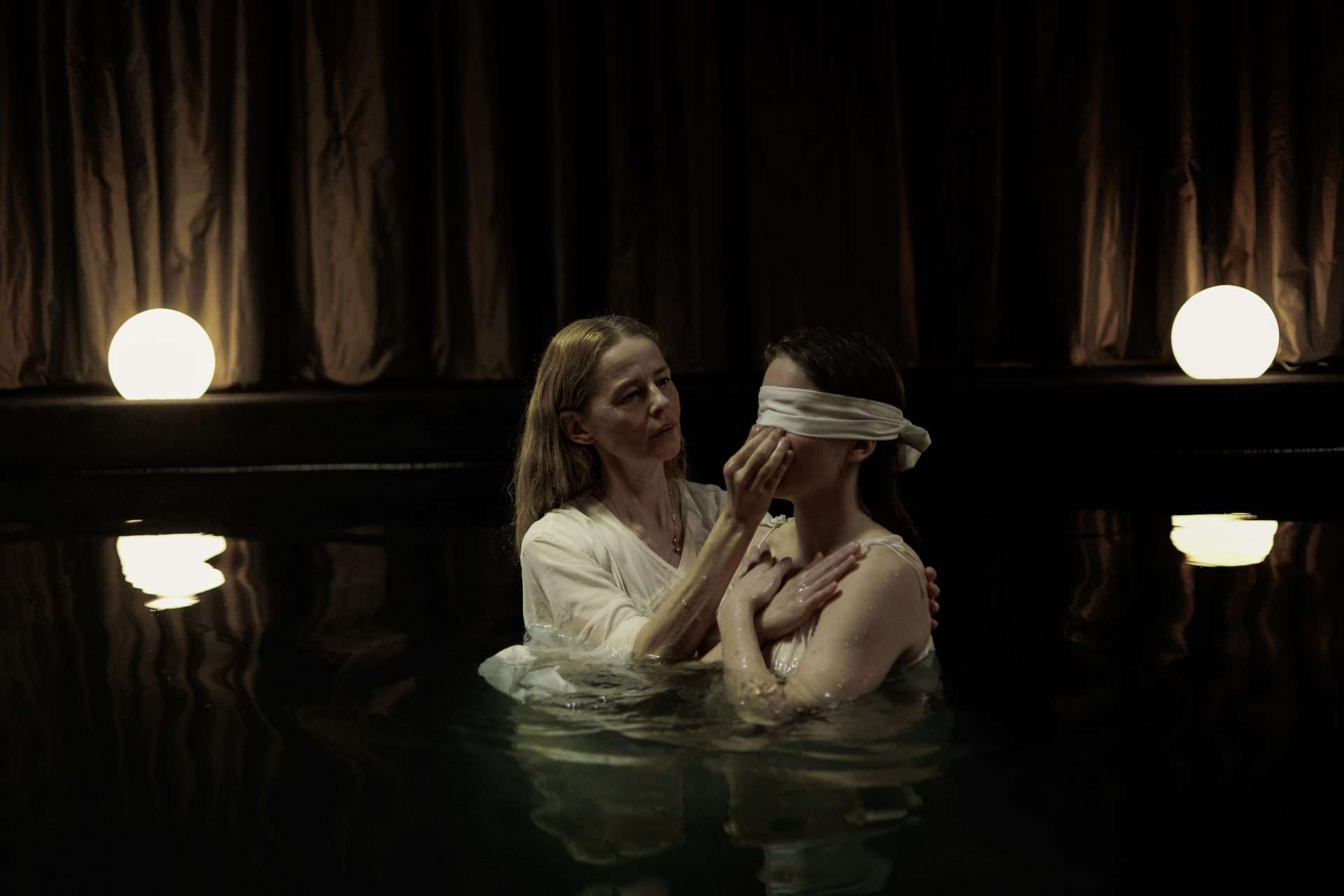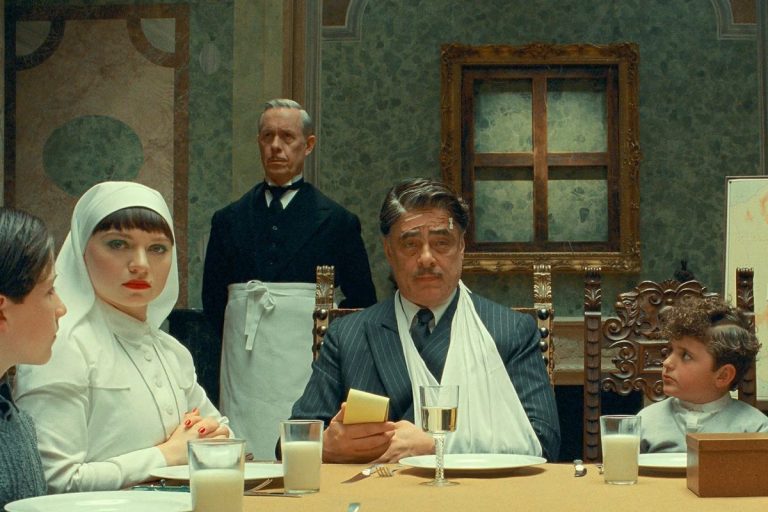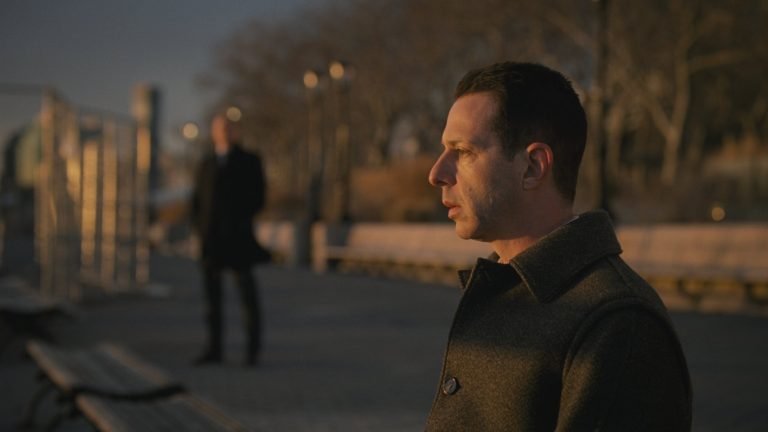Natatorium (2024) ‘SXSW’ Movie Review: What does it mean to mire in dysfunctional dynamics? There is a telltale loss of autonomy that is a part of such relationships, where unspoken fears manifest in ugly outbursts or, worse, wilful silence in the face of injustice. When such dysfunction defines families, the optics of right or wrong, and everything in between, become further muddled: it is, perhaps, more difficult to stand up to someone you are conditioned to love, even when they seem to be gradually sapping the life out of those around you. Cycles of trauma can perpetuate in ways unanticipated, but in the end, someone has to break the loop, lest this ouroboros of cruelty is allowed to fester forever.
Helena Stefánsdóttir’s debut feature, “Natatorium,” is not interested in breaking the loop — instead, it hones in on the finer textures of this ouroboros, examining how such complex evils are left unchecked until it is too late. There is an uneasy rhythm to the horror-thriller right from the start, where the everyday objects of a gorgeous designer house are mirrored in deep, dark hues, as they are remnants of several lives shaped by evil hiding in plain sight. There are no demons or spirits here, at least of the obvious or tangible sort, but the house that acts as the site for the horrors to come emerges as a silent, nefarious vessel in of itself.
Lilja (Ilmur María Arnarsdóttir), an 18-year-old aspiring actor, travels to her grandmother Áróra’s (Elin Petersdottir) home with the intention of temporarily staying there while she prepares for an art entrance exam. Lilja carries herself with carefree grace, much like a young person eager to taste the fruits of life, but also displays a brand of innocence so unbelievably naive that it often feels at odds with her obvious depth. The young artist’s sensitivities shine when she plays cello in the early hours of the morning or dances around in her nyad costume without a care in the world, but at other times, she sees but rarely observes. Perhaps it is this innate half-measure that blinds her to the machinations unraveling around her in plain sight.
Áróra’s presence flits between faux warmth and stark cruelty, and the latter is evident even when she is playing the doting grandmother, especially when tending to her terminally ill son, Kalli (Jónas Alfreð Birkisson). Kalli’s deteriorating condition feels more acute as we get to spend more time with him, and the moments where he tenderly connects with his twin, Vala (Stefanía Berndsen), feel poignant, heartbreaking, and infused with mystery.
The difference between the ways Vala and Áróra tend to comfort Kalli tells us everything we need to know: while Vala is warm and authentic, Áróra is cold and clinical, treating him like a messed-up painting she created, almost like a work-in-progress whose value lies in ritualistic decay. As time passes, it becomes clear that everyone, including Lilja’s father, Magnús (Arnar Dan Kristjánsson), wants her to stay elsewhere, as Áróra and the house itself seem to have a hold on Lilja’s unsuspecting innocence (and even their traumatized, fractured selves, to an extent).

Beneath the stately opulence of the villa, there lies a secret in the form of a body of water that should never have existed, acting as a portal to another world best left unexplored. The nature of this pool is so violently morbid, chiefly in terms of what it symbolizes and the horror it holds within its depths, that it feels like a natural extension of Áróra’s rot and not the other way around.
The family secret plays out like a MacGuffin instead of a nasty, intriguing reveal — in many ways, this approach works, as it allows “Natatorium” to explore the various shades of trauma responses that the characters exhibit. Some, like Vala, tell the cold, hard truth amid passionate outbursts and crying spells (enhanced by her alcoholism), while others, like Magnús, respond with spineless fence-sitting despite the fact that a lot is on the line, distancing themselves from the point that they view the trauma from a neutral, detached perspective.
Although these impulses are valid in the face of how these children grew up in a home where their father remained but a mute bystander as evil festered, “Natatorium” does not explore these emotions enough to lend gravity to the terrifying, yet abrupt climax that ultimately feels out of place. Vagueness keeps mysteries alive, allows them to thrive, and takes on nightmarish faces that keep us awake. Much of this vagueness lends “Natatorium” a heady, otherworldly feel, instilling a hunger for the truth, no matter how ugly it might be. However, the truth is not the point here — what matters is that the quick peeks we are granted into the dark secrets are almost enough to hold the thriller together.
Almost, as the film’s beautiful, hypnotic cinematography begs to be complemented with more depth, more insidiousness than just the vague insinuation about the depraved narcissism of a mother bent on punishing her own with carefully designed hellscapes. Stefánsdóttir’s feature is a promise, however, of stories that situate horror at the hearth, where we often warm our feet and hold our loved ones close (who might choose this moment to snuff the air out of our lungs). A fever dream with countless unexplored visions, “Natatorium” is aimed to leave you both sated and hollow.








![Rewriting History with the Ink of Film: Once Upon a Time in Hollywood [2019]](https://79468c92.delivery.rocketcdn.me/wp-content/uploads/2019/08/once-upon-a-time-in-hollywood-768x427.jpeg)